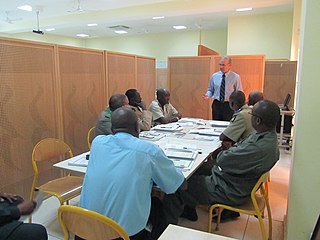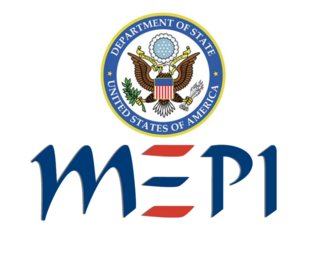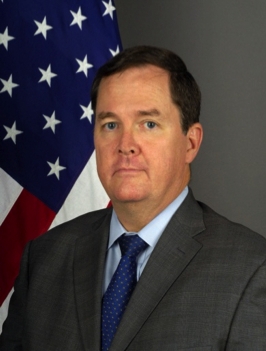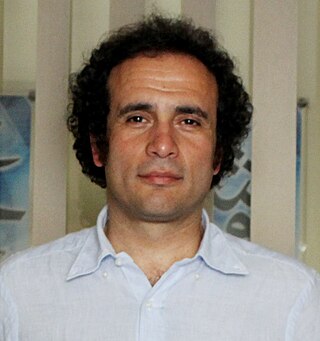Walter Ze'ev Laqueur was a German-born American historian, journalist and political commentator. He was an influential scholar on the subjects of terrorism and political violence.

The state of Democracy in Middle East and North Africa can be comparatively assessed according to various definitions of democracy. According to The Economist Group's Democracy Index 2023 study, Israel is the only democratic country in the region, qualified as a "flawed democracy". According to the V-Dem Democracy indices, the Middle Eastern and North African countries with the highest scores in 2024 are Israel, Tunisia and Iraq.
Wilsonianism, or Wilsonian idealism, is a certain type of foreign policy advice. The term comes from the ideas and proposals of President Woodrow Wilson. He issued his famous Fourteen Points in January 1918 as a basis for ending World War I and promoting world peace. He was a leading advocate of the League of Nations to enable the international community to avoid wars and end hostile aggression. Wilsonianism is a form of liberal internationalism.

The Greater Middle East is a geopolitical term introduced in March 2004 in a paper published by the Carnegie Endowment for International Peace as part of the United States' preparatory work for the Group of Eight summit of June 2004. The paper presented a proposal for sweeping change in the way the West deals with the Middle East and North Africa. It also denotes a vaguely defined region encompassing the Arab world, along with Afghanistan, Iran, Turkey, and sometimes the Caucasus and Central Asia.
Janet Afary is an author, feminist activist and researcher of history, religious studies and women studies. She is a professor and the Mellichamp Chair in Global Religion and Modernity at the University of California, Santa Barbara (UCSB).

Leila Farsakh is a Palestinian political economist who was born in Jordan and is a Professor of Political Science at University of Massachusetts Boston. Her area of expertise is Middle East Politics, Comparative Politics, and the Politics of the Arab-Israeli Conflict. Farsakh holds a MPhil from the University of Cambridge, UK (1990) and a PhD from the University of London (2003).

Democracy promotion, also referred to as democracy building, can be domestic policy to increase the quality of already existing democracy or a strand of foreign policy adopted by governments and international organizations that seek to support the spread of democracy as a system of government. In practice, it entails consolidating and building democratic institutions

Aaron David Miller is an American Middle East analyst, author, and negotiator. He is a senior fellow at the Carnegie Endowment for International Peace, focusing on U.S. foreign policy. He previously was vice president for new initiatives at the Woodrow Wilson International Center for Scholars, and has been an advisor to both Republican and Democratic secretaries of state. He is a Global Affairs Analyst for CNN.

Robin B. Wright, is an American foreign affairs analyst, author and journalist who has covered wars, revolutions and uprisings around the world. She writes for The New Yorker and is a fellow of the U.S. Institute of Peace and the Woodrow Wilson Center. Wright has authored five books and coauthored or edited three others.
Rola Abdulla Dashti is a Kuwaiti economist and business executive and former politician and minister. Dashti lobbied for the May 2005 decree permitting Kuwaiti women to run for parliamentary elections for the first time and was one of the first female MPs elected to the Kuwaiti parliament. She subsequently served as minister of state planning and development affairs and State Assembly affairs.

The U.S.-Middle East Partnership Initiative (MEPI) is a United States State Department program that fosters meaningful and effective partnerships between citizens, civil society, the private sector, and governments in the Middle East and North Africa (MENA) region to resolve local challenges and promote shared interests in the areas of participatory governance and economic opportunity and reform.
Fadia Faqir is a Jordanian British author and academician, involved in human rights issues. She was born in Amman, Jordan, and her father is from Jordan, of the tribe Al-Ajarmah. But her mother is Circassian.

Thomas O. Melia currently serves as Washington director at PEN America. Previously, he served in the Obama Administration as USAID's Assistant Administrator for Europe and Eurasia (2015–2017) and as Deputy Assistant Secretary of State in the Bureau of Democracy, Human Rights, and Labor at the United States Department of State (2010–2015). Melia also served as Executive Director of Democracy International, an organization that designs, implements, and evaluates democracy and governance programs around the world. Additionally, he was the Deputy Executive Director of Freedom House, a human rights organization.

Democracy promotion by the United States aims to encourage governmental and non-governmental actors to pursue political reforms that will lead ultimately to democratic governance.

Amr Hamzawy is an Egyptian political scientist, human rights activist and public intellectual.
Thomas Carothers is an American lawyer and international relations scholar. His research focuses on international democracy support, democratization, and U.S. foreign policy. He is a senior fellow at the Carnegie Endowment for International Peace, where he founded and currently co-directs the Democracy, Conflict, and Governance Program. He has also taught at several universities in the U.S. and Europe, including Central European University, the Johns Hopkins School of Advanced International Studies, and Nuffield College, Oxford.

Fatima Sadiqi is a senior professor of Linguistics and Gender Studies at Sidi Mohamed Ben Abdellah University, in Fez, Morocco.

Tanja A. Börzel is a German political scientist. Her research and teaching focus on the fields of European Integration, Governance, and Diffusion. She is professor of Political Science at the Otto-Suhr-Institute of Political Science of Freie Universität Berlin, director of the Center for European Integration, and holder of the Jean Monnet Chair for European Integration from 2006 until 2009. Currently, she is department chair of the Otto-Suhr-Institute of Political Science.
Nolan Matthew McCarty is an American political scientist specializing in U.S. politics, democratic political institutions, and political methodology. He has made notable contributions to the study of partisan polarization, the politics of economic inequality, theories of policy-making, and the statistical analysis of legislative voting.
Lina Khatib is Director of the SOAS Middle East Institute at SOAS University of London, where she is MBI Al Jaber Chair in Middle East Studies and Professor of Practice in the Department of Politics and International Studies.











